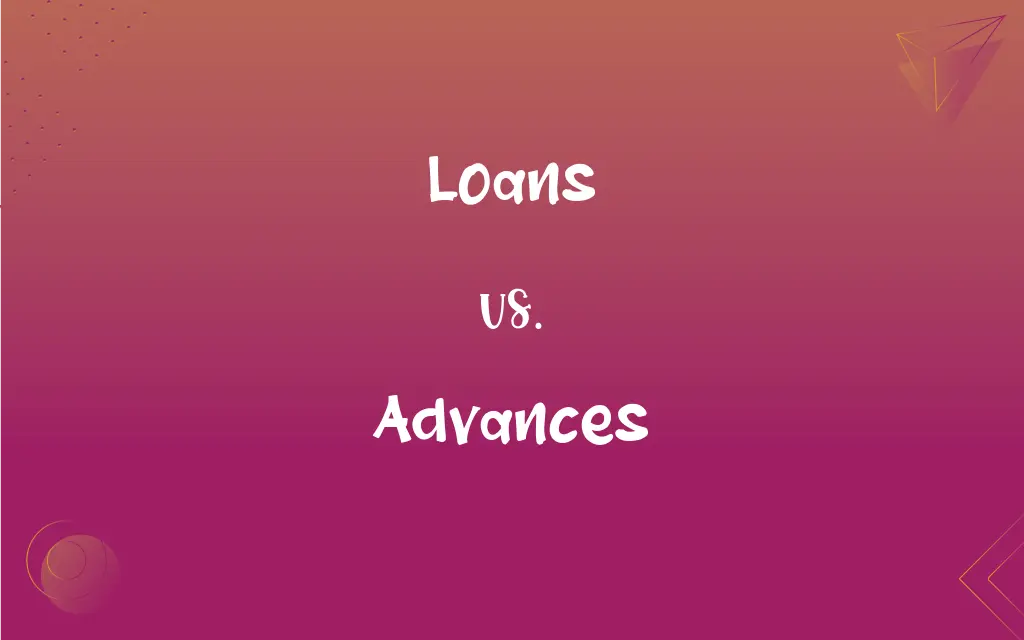Loans vs. Advances: What's the Difference?
Edited by Aimie Carlson || By Harlon Moss || Updated on October 24, 2023
Loans are borrowed sums of money to be paid back with interest over time, while advances are short-term funds or credits provided by institutions.

Key Differences
Loans typically refer to a borrowed sum of money from financial institutions that are expected to be repaid with interest over an agreed period. These often have a structured repayment schedule and are subject to specific terms and conditions. Conversely, advances are typically short-term funds or credit provided by institutions, often payable within a short time frame.
Loans usually come with a formal agreement that includes the terms of repayment, interest rates, and collateral requirements if any. On the other hand, advances might not always have such detailed terms and may even be interest-free in some cases, like salary advances.
The interest charged on loans tends to be calculated over the tenure of the loan, and it can be fixed or variable. In contrast, advances, if they carry interest, might have it calculated on a daily basis until the amount is repaid. While both loans and advances are mechanisms to access funds, the purposes can differ.
Loans are often for larger expenses like buying a home, car, or for education. Advances are usually for immediate or urgent needs.
Comparison Chart
Nature
Long-term borrowing
Short-term borrowing or credit
ADVERTISEMENT
Repayment Duration
Longer tenure, often years
Shorter duration, often within months
Interest
Calculated over the loan tenure
Might be calculated daily until repaid
Formality
Structured with detailed agreements
Often less formal, e.g., salary advances
Purpose
Larger expenses like home, education
Immediate or urgent needs
Loans and Advances Definitions
Loans
The act of lending something to someone.
The library offers loans of books for a month.
ADVERTISEMENT
Advances
Money paid before a service is rendered or goods are delivered.
She paid advances to the caterer for her wedding.
Loans
Money borrowed that must be paid back with interest.
He took out loans to pay for his college education.
Advances
The forward movement of something.
The advances of the army were swift and strategic.
Loans
A sum of money provided temporarily on the condition it'll be returned.
Business loans helped her start her cafe.
Advances
An improvement or development in a particular area.
Technological advances have changed the way we live.
Loans
An arrangement in which a lender gives money or property to a borrower.
The bank provides home loans to eligible customers.
Advances
An approach made to someone, often with a proposal.
He was wary of the stranger's advances.
Loans
The grant of temporary possession.
The museum has art loans from all over the world.
Advances
Money provided by a company to an employee before it's typically due.
His boss gave him salary advances due to an emergency.
Loans
An instance of lending
A bank that makes loans to small businesses.
Advances
To cause to move forward
Advance a chess piece.
FAQs
Why do people take out loans?
People take loans for various reasons like buying homes, cars, education, or business needs.
Are loans always provided with an interest?
Most loans carry interest, but some, like interest-free loans, do not.
Are advances the same as payday loans?
No, while both provide funds before a typical payment date, payday loans have high-interest rates, whereas salary advances might be interest-free.
Are advances always short-term?
Advances are typically short-term, but the exact duration can vary based on the agreement.
Can I refinance a loan?
Yes, refinancing is when you replace your current loan with a new one, usually with better terms.
How do banks decide loan eligibility?
Banks consider income, credit history, employment, and other factors to determine loan eligibility.
Are advances considered income?
Advances like salary advances aren't typically considered extra income as they're pre-payments of your salary.
Can loans affect my credit score?
Yes, how you manage your loans, like timely repayments, can impact your credit score.
Can advances be provided for services?
Yes, advances can be paid to service providers before they render their services.
Can I get an advance on my credit card?
Yes, credit cards often allow cash advances, but they might come with high-interest rates.
How do interest rates on loans work?
Interest on loans is a percentage of the principal amount, charged periodically, usually monthly or annually.
Can loans be secured and unsecured?
Yes, loans can be both secured (with collateral) and unsecured (without collateral).
What happens if I default on a loan?
Defaulting on a loan can lead to penalties, higher interest rates, legal actions, and credit score damage.
Can I get an advance against my inventory?
Yes, some institutions provide inventory advances against unsold goods.
What are merchant cash advances?
Merchant cash advances provide businesses with a lump sum in exchange for a share of future sales.
How are loan EMIs calculated?
Loan EMIs are calculated based on the principal amount, interest rate, and loan tenure.
What's a loan moratorium?
A loan moratorium is a temporary suspension or reduction of loan repayments.
Are there different types of advances?
Yes, advances can vary, like salary advances, merchant cash advances, or inventory advances.
Are advances only monetary?
Mostly, but advances can also refer to progress or forward movements in non-monetary contexts.
Are advances provided by all companies to employees?
Not all companies provide advances to employees; it depends on company policy and the employee's situation.
About Author
Written by
Harlon MossHarlon is a seasoned quality moderator and accomplished content writer for Difference Wiki. An alumnus of the prestigious University of California, he earned his degree in Computer Science. Leveraging his academic background, Harlon brings a meticulous and informed perspective to his work, ensuring content accuracy and excellence.
Edited by
Aimie CarlsonAimie Carlson, holding a master's degree in English literature, is a fervent English language enthusiast. She lends her writing talents to Difference Wiki, a prominent website that specializes in comparisons, offering readers insightful analyses that both captivate and inform.
































































